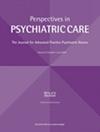Workplace Spirituality, Compassion Satisfaction, Burnout, and Secondary Traumatic Stress: A Cross-Sectional Study in Iranian Nurses
IF 1.9
4区 医学
Q2 NURSING
引用次数: 0
Abstract
Purpose. This study aimed to (1) assess the levels and associations of workplace spirituality (WPS), compassion satisfaction (CS), burnout (BO), and secondary traumatic stress (STS) among Iranian nurses; and (2) identify the impact of WPS components on CS, BO, and STS while controlling for demographic variables. Design and Methods. In this descriptive, cross‐sectional, and correlational study, 295 nurses were selected via proportionate stratified sampling from five hospitals affiliated with the Arak University of Medical Sciences in Iran from June 2022 to December 2022. The scale of workplace spirituality and Professional Quality of Life version 5 (ProQOL-5) were used for data collection. Data were analyzed using SPSS24 and descriptive and inferential statistics (Pearson correlation coefficient and multiple regression). Findings. The mean scores of WPS, CS, BO, and STS were 63.27, 36.55, 27.31, and 29.58, respectively. The highest percentages of nurses reported moderate CS, BO, and STS levels, reaching rates of 76.3%, 80%, and 86.1%, respectively. The Pearson correlation coefficient showed that CS had a negative relationship with BO and STS. There was a direct correlation between BO and STS. Participants who reported higher levels of WPS had higher CS and lower BO scores. Results of multiple regression analyses indicate that the model of WPS components and control variables explains 42.7, 34, and 8.6 percent of the variance of CS, BO, and STS, respectively. Higher “meaningful work” is associated with higher CS and lower BO and STS among nurses. Participants higher in “sense of community” had higher CS scores. Higher “alignment with organizational values” is associated with higher STS. Practice Implications. According to the study results, it is possible to provide a suitable platform for improving nurses’ professional quality of life by strengthening workplace spirituality.工作场所灵性、同情满意度、倦怠和继发性创伤压力:伊朗护士的横断面研究
意图本研究旨在(1)评估伊朗护士的工作场所精神(WPS)、同情满意度(CS)、倦怠(BO)和继发性创伤压力(STS)的水平和相关性;以及(2)识别WPS成分对CS、BO和STS的影响,同时控制人口统计变量。设计和方法。在这项描述性、横断面和相关性研究中,从2022年6月至2022年12月,通过比例分层抽样从伊朗阿拉克医学科学大学附属的五家医院选出295名护士。工作场所精神和职业生活质量量表第5版(ProQOL-5)用于数据收集。使用SPSS24和描述性和推断统计学(Pearson相关系数和多元回归)对数据进行分析。调查结果。WPS、CS、BO和STS的平均得分分别为63.27、36.55、27.31和29.58。报告中等CS、BO和STS水平的护士比例最高,分别达到76.3%、80%和86.1%。Pearson相关系数表明CS与BO和STS呈负相关。BO与STS之间存在直接相关性。报告WPS水平较高的参与者CS得分较高,BO得分较低。多元回归分析结果表明,WPS成分和控制变量的模型分别解释了CS、BO和STS的42.7%、34%和8.6%的方差。护士中较高的“有意义的工作”与较高的CS、较低的BO和STS相关。“社区意识”较高的参与者CS得分较高。更高的“与组织价值观的一致性”与更高的STS相关。实践启示。根据研究结果,通过加强工作场所精神,可以为提高护士的职业生活质量提供一个合适的平台。
本文章由计算机程序翻译,如有差异,请以英文原文为准。
求助全文
约1分钟内获得全文
求助全文
来源期刊
CiteScore
5.00
自引率
4.30%
发文量
139
审稿时长
>12 weeks
期刊介绍:
Perspectives in Psychiatric Care (PPC) is recognized and respected as THE journal for advanced practice psychiatric nurses. The journal provides advanced practice nurses with current research, clinical application, and knowledge about psychiatric nursing, prescriptive treatment, and education. It publishes peer-reviewed papers that reflect clinical practice issues, psychobiological information, and integrative perspectives that are evidence-based. Perspectives in Psychiatric Care includes regular columns on the biology of mental illness and pharmacology, the art of prescribing, integrative perspectives, and private practice issues.

 求助内容:
求助内容: 应助结果提醒方式:
应助结果提醒方式:


